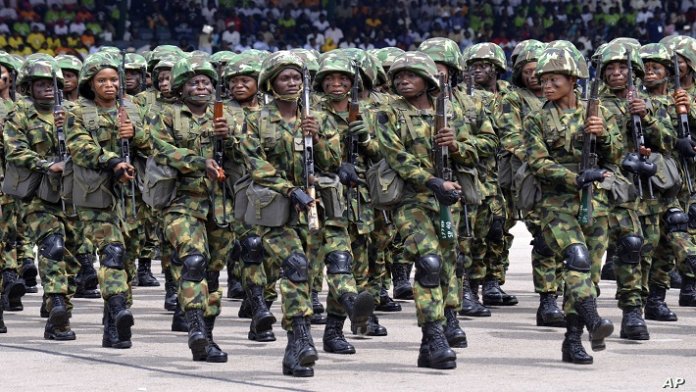
There are reports that Nigerian soldiers have shot at students protesting over the lack of military protection for a Christian-majority area which came under attack by Fulani militia. Release International is calling for an inquiry.
The Nigerian authorities have acknowledged that two students were shot by security forces but claim they were hit by stray bullets. They say the army opened fire during what they describe as ‘emotional protests’.
Other sources say more students were wounded. They accuse the army of twice opening fire on civilian protesters in the space of a week.
In an unfolding situation with conflicting accounts, it’s claimed more than 40 mainly Christian farmers have been killed by Fulani militants over seven days, and that students who protested the lack of military protection have been fired on by the army.
UK-based Release International, which supports persecuted Christians worldwide, is calling for an investigation.
Inquiry call
‘Release International has repeatedly reported the failure of Nigerian military to protect Christian villagers, even when they have been warned in advance of attacks. But this is the first time we have heard that soldiers have opened fire on those they should be protecting,’ says Paul Robinson of Release International.
‘Given these disturbing and conflicting accounts, the role of the military in these allegations must be investigated in full. An inquiry must also investigate the wider question: why, despite a military presence, are the attacks by Fulani militia continuing – even when the military is given due warning?
‘More – much more – must be done to protect Nigeria’s vulnerable Christian communities.’
Violence rising
Release International highlighted Nigeria as a country where violence against Christians is rising in its 2024 Persecution Trends report. Nigerian NGO Intersociety say 52,000 Nigerian Christians have been killed by jihadists since 2009, and 18,000 churches destroyed.
Partners of RI, which serves persecuted Christians around the world, report that Christian-majority villages in Plateau State came under attack from Fulani militia on the night of April 18. Villages in the area have been repeatedly targeted.
According to the Nigerian media, militia began their attack on communities in Bokkos and Mangu areas in Plateau State while residents were sleeping. One village was close to the university.
Computer science student Dading James Jordan was among those killed, along with a pregnant woman.
The following morning, April 19, students from Plateau State University carried the body of Dading James to the military checkpoint in Bokkos. They were protesting the lack of military protection, when troops opened fire. It’s alleged the students set fire to the military checkpoint.
Students shot
The Nigerian Foundation for Investigative Journalism say soldiers ‘shot into the sky, but later aimed at students’, killing one and wounding another. Plateau State University has been closed to try to calm the situation.
According to Bokkos Development Council (BCDC) three protesters were killed. The military have denied shooting at the students.
BCDC said, ‘Some officers of the Special Task Force have been identified as harassing civilian defenders, while turning a blind eye to Fulani attackers.’
They continued: ‘As we write, convoys of motorcycles, each carrying three armed Fulani terrorists continue to wreak havoc by attacking villages.
‘Despite the residents’ attempts to resist using sticks, stones, slingshots and farming implements, soldiers intervened by shooting at them and dispersing their defence efforts. Meanwhile Fulani terrorists, armed with automatic rifles, remained unchallenged just 500 metres away.’
BCDC said this was not the first time that troops had fired live rounds towards those trying to defend their areas from attack. The Council accused the military commander of ‘shooting at six youths protecting their village of Kopyal from a terrorist invasion on April 13.’
Commanding officer
They also accuse their commanding officer, Colonel Ofurmazi, of refusing to order the arrest of the Fulani attackers, who were armed with assault rifles.
On April 18, the BCDC claim the military attacked residents of another village, Butura Kampani, who were trying to defend their homes.
‘The military teams, instead of stopping the invasion, turned on the residents, attacking and arresting them even as they witnessed their homes going up in flames and tried to rescue the injured.’ According to the BCDC, two were killed in the Fulani attack, others were injured and there was extensive damage to property.
But instead of taking action against the invaders, the council claim the military disarmed and detained up to 15 residents who were trying to defend their homes.
The Fulani militants then struck again at Chikam village, three miles away, killing three, including student Dading James Jordan. It was this incident that led to the student protest at the military checkpoint.
‘Three killed’
According to the BCDC, the military ‘opened fire on them, reportedly killing three and injuring several others.’ They have called for an official inquiry into the use of lethal force against unarmed students.
As the Fulani raids continued, women and youths staged further protests at the military headquarters in Bokkos, calling for the removal of the commander, Colonel Ofurmazi.
In their statement, the BCDC described the Fulani attacks and the actions of the troops as having the appearance of ‘a joint operation by the armed forces and Fulani terrorists against innocent and unarmed civilians.’
They say it took the intervention by a larger military force from the Plateau State capital, Jos, to restore order.
In response, the military have defended the neutrality of their commanding officer and claim their troops took action to protect citizens from the raiding militia.
This latest round of attacks is said to be the work of the same group of Fulani militia that attacked villages in the area on Christmas Eve, killing around 200 and driving up to 20,000 from their homes. Five years earlier, in co-ordinated attacks on the same area, Fulani militia killed 235 villagers. The Nigerian military were given warning of both attacks yet failed to prevent them.
Acting on intelligence, Release International’s partners are sending out warnings to local communities via text messages. They’re also providing vital assistance in the form of trauma counselling for the victims of the attacks.
‘Provoking conflict’
They say the attacks are part of a concerted plan to provoke religious conflict across several states. The United States Commission on International Religious Freedom describes the violence as having a ‘deadly implication’ for religious communities and imposing a threat to religious freedom.
RI partners add, ‘This is religious cleansing by armed Muslim Fulani herdsmen who believe in religious war. This is an Islamic jihad. The Fulani carry out their carnage unchallenged. The soldiers should be protecting the people from these attacks.
‘We send our condolences to the families concerned and the staff and students of Plateau State University, Bokkos. And we encourage all, especially the students, to stay calm.’
‘Release International again urges the government of Nigeria and its security forces to take urgent measures to safeguard Christian communities from attack,’ says Paul Robinson. ‘Their ineffectiveness is being noted around the world.’
Release International is active in some 30 countries. It works through partners to prayerfully, pastorally, and practically support the families of Christian martyrs, prisoners of faith and their families. It also supports Christians suffering oppression and violence, and those forced to flee.


